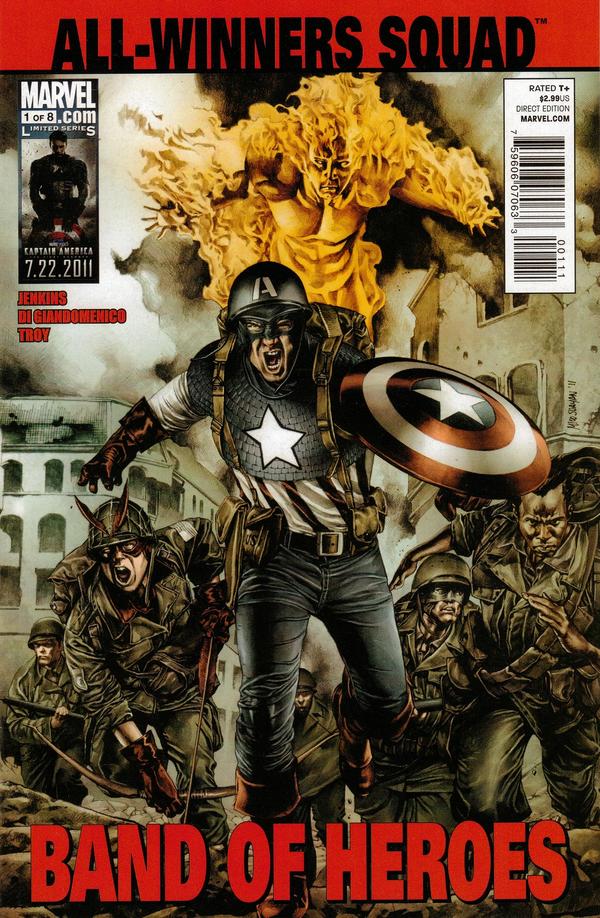All-Winners Squad: Band of Heroes 1
Reviewed by Martin Skidmore 13-Jul-11
This strikes me as a total disaster area of a comic. First, purge your mind of any previous knowledge of the All-Winners Squad, more or less the same as the Invaders: this lot has no Torch (though is that supposed to be him on the cover?) or Sub-Mariner or Whizzer, though it does have Cap and Bucky. We see them from 1944 in mostly army uniform with a bunch of other soldiers who wear masks.
This strikes me as a total disaster area of a comic. First, purge your mind of any previous knowledge of the All-Winners Squad, more or less the same as the Invaders: this lot has no Torch (though is that supposed to be him on the cover?) or Sub-Mariner or Whizzer, though it does have Cap and Bucky. We see them from 1944 in mostly army uniform with a bunch of other soldiers who wear masks. Some of these have code names, but don’t actually show us any superpowers. Actually one of them might, but the art wasn’t clear enough to make me sure of that. Mostly they seem to be supinely letting some Nazis kill them.
Once we’re through that, we get to the really bad part, again interrupted by a wartime scene, with more new army superheroes, of no obvious consequence. We move to modern times, and an old man telling his granddaughter about the comics Timely (who are now Marvel, of course), his employers, were putting out back then. He tells her they were commissioned by the military as recruitment propaganda, and this is why some were cancelled despite good sales: the heroes they depicted got killed. This clearly implies that they felt obliged to base the stories on real adventures, which is implausible on all sorts of levels; it also means Cap the comic succeeded not because it was actually good but because Cap thrived – except of course his comic extended beyond his and Bucky’s apparent deaths. Retro continuity had replacements for them, of course, so why not do that for other deaths? How would constantly cancelled heroes work as positive propaganda? Were other comic companies also so commissioned? Presumably not, as in the Marvel Universe, DC heroes can’t have existed too, for instance. Were these Timely titles so faithful to the truth? Are we supposed to believe the Cap comics were as we know them, giving away their secret identities and so much else? If not, why did they have to be based on reality at all?
This seems an idea that should have been squashed immediately, as it makes no sense and raises all kinds of big problems. It’s also a miserable bore, if the message is that there were loads of heroes killed in those days, and a sinister lurker outside as the granddaughter reads some of these old comics does nothing to liven matters up. Nor does the final page twist, which makes no sense, as it surely denies the old man’s story about working for Timely.
Add in the really lousy combat leadership of Cap in the opening sequence, the confusing mess of the art for large portions of this, plus Di Giandomenico’s inability to offer any expressions to the characters, and the dullness and idiocy of the story, and this really is a dreadful comic on pretty much every level. I wonder if it will survive its planned eight-issue run.
Tags: All-Winners Squad, Captain America, Carmine Di Giandomenico, Marvel, Paul Jenkins
Great review, Martin ! Not least because it saved me from making the mistake of buying this trash.
– And it’s with belated glee that I note that this series’ final issues were never published, as it was mercifully euthanised at issue # 5; Martin’s physical health may have been deteriorating when he wrote this review, but it looks like his psychic powers were spot on…